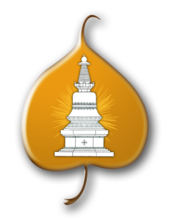Notes from SPC Donna Seese in Prayer Flag monthly newsletter
March, 2020
Spring is opening all around us, with visual reminders of renewal and new beginnings. As the days pass and the sun strengthens, we see plants that are already in the ground awaken and grow, and new ones arising from seeds.
Likewise, when we say the dedication prayers, we renew our aspiration to develop bodhicitta, the mind that works to benefit others in every moment, in every action, in every word and thought:
May the supreme jewel bodhicitta that has not arisen arise and grow,
And may that which has arisen not diminish, but increase more and more.
May all our hearts flourish in love and happiness this spring!
February, 2020
Imagine that your very existence is viewed as a nuisance to others who are very powerful, and who share the same space with you. Imagine that those powerful beings have a choice to act on annoyance and remove you, or to act on compassion and coexist with you.
We have this choice with the tiny creatures creeping around our homes and yards in their little insect and spider bodies. They creep us out, they freak us out, we want them to go away!
Lama Zopa Rinpoche has a deep sense of compassion for these animals, and often mentions these itty-bitty critters who excite such feelings of fear and revulsion in us. FPMT has a beautiful article that describes how Rinpoche and students living at Amitabha Buddha Pure Land in Washington state work to benefit the critters they encounter, both those who have died and those who are still living.
Find inspiration and Rinpoche’s advice here.
January, 2020
We spend a lot of time each day on the simple logistics of life – going up and down stairs, walking from room to room, taking a shower – neutral activities that are just part of the mechanics of operating in the physical world. We do them without thinking, with our minds rabbiting on about something else. But these mindless actions hold great potential!
Lama Zopa Rinpoche devoted much of the first few Light of the Path Retreats to teaching on how to make those automatic activities into spiritual practice, by developing simple habits of thought association. Rinpoche taught that “even the activities that we normally do – such as eating, sleeping,
sitting, walking, and doing our jobs – can become ways to collect unfathomable virtue and skies of merit. With mindfulness of bodhichitta, they can become not only beneficial to oneself, but beneficial to all sentient beings.”
For example, when going up stairs, think that we are leading all sentient beings out of the lower realms into enlightenment. When opening a door, think that we are opening the door to wisdom for all sentient beings. When closing a door, think that we are shutting out the suffering of samsara for all beings. When washing, think that we are washing away all negative karma for all beings.
Rinpoche offered dozens of ways to transform simple actions that we perform over and over again, each day, into powerful spiritual practice. As we start a new year, we can challenge ourselves, choose one or two – or more! – practices and weave them into our days.
You can find a list of these Bodhicitta Mindfulness Practices, with Rinpoche’s advice,
here on the FPMT website.
December, 2019
What do we do when there’s a problem and we can’t fix it? When we encounter a hungry child – not just one, but dozens – and lack the resources to feed them all. When we read about the plight of millions of people made homeless by war, geopolitics, natural disaster – and have no ability to give them safe homes, jobs, enough to eat, or education.
It’s hard to see suffering and, at the same time, recognize that we don’t have the capacity to set things right. Our money, our power, our wisdom won’t stretch that far. In such moments, it can be tempting to shut down and turn away. But this is exactly the moment when we can dig deep for the courage to be a bodhisattva warrior, to acknowledge our current limitations and renew our determination to overcome them.
During a recent Sunday teaching, as we discussed how to deal with this difficulty, Geshe Gelek reminded us that even if we can’t do something practically to end the suffering of others, we can turn to our prayers, and dedicate them to benefit others who are suffering.
“In the West, solution means fix,” he said. “If you don’t fix, there’s no solution ... Maybe praying is the solution. It might not fix things right away, but it fixes something here (pointing to his heart) … Buddhist philosophy is not always about fixing things. It’s about doing something to feel we are contributing something. Living a life for others, through prayer, through practices – that is the purpose of life.”
November, 2019
"We don’t have to drown in our wrongdoing. We can flow.”
With these words, Geshe Gelek reminds us of the benefit of spiritual practice. When we think about our mistakes, instead of feeling guilty and upset with ourselves, we can use the simple tool of purification to restore our minds to equanimity. Then we can rest in a mind of compassion, loving kindness and joy.
October, 2019
"A few weeks ago, I tracked down a remote place that is precious to my family – the cottage where my mother lived as a child with her grandparents, almost 100 years ago. Finding it in disrepair, I found myself fantasizing about restoring it into a home. I would haul out the trash, paint, patch the leaks, scrub the carefully fitted flagstone floors and the beautiful arched hearth until once again, it would be a place where people I loved could visit, live, and be happy.
This, I realized, is what we do in purification practice. We recognize the preciousness of our minds and our own good qualities, the beauty that struggles to shine through the accumulated grime of our negative habits. Then, with loving care, we set about restoring our minds to their true potential. We haul out the anger and despair, scrub away pettiness and discontent, so that our very minds can become a warm and welcoming shelter and refuge, for ourselves, and for any other being we encounter."
September, 2019
“Wants to be happy, doesn’t want to suffer.” Those few words in plain language can be so helpful when we’re struggling to feel compassion for another, especially if their actions or language are harsh or hurtful. In place of “What a jerk!” the thought can be, “wants to be happy, but doesn’t know how to accomplish that… doesn’t want to suffer, but choosing unskillful ways to stop the pain.”
Thinking this way helps us be, not a critic, who only sees the outer expression of suffering, but an ally who empathizes with the unhappy mind behind the hurtful actions, and helps us soften our hearts.



